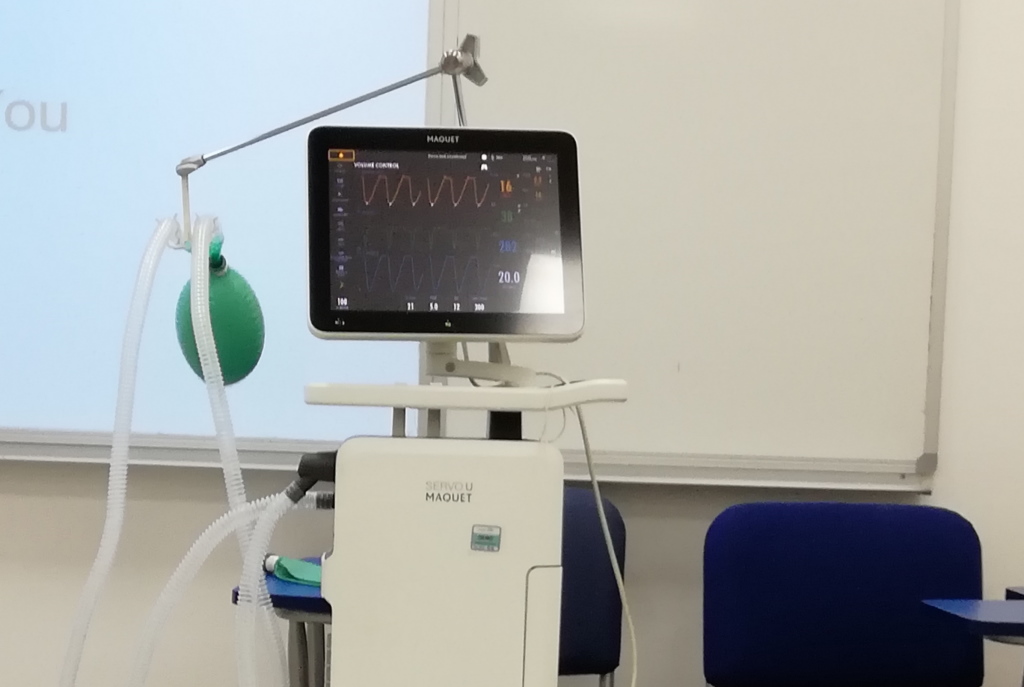Missing Ventilators Restart Fight Over Federal Funds Oversight
Auditors found some COVID-19 supplies missing, triggering debate about who should control aid dollars.

Ventilator. Photo by Ashashyou / (CC BY-SA)
The six ventilators were valued at $122,300 and only 2% of the 308 ventilators given to hospitals, fire and rescue departments and emergency medical providers by state officials to keep alive those sick with COVID-19 during the worst two years of the pandemic.
But, state auditors reported to the Legislature, the six ventilators deployed by the Wisconsin Department of Health Services (DHS) were missing as of January. By April, two of the six had been found.
“DHS should inventory all of its ventilator-related equipment,” auditors recommended.
“In addition, DHS should improve its records regarding the location and deployment of ventilators,” auditors added. “Taking these actions will help DHS to improve its oversight of ventilators and equipment that cost $38.7 million.”
The $38.7 million was a reference to what DHS spent to buy and maintain 1,542 ventilators. Auditors reported that 308 of them were used.
But six missing ventilators wasn’t the only finding in the May audit that restarted the Capitol debate over whether governors and legislators should share decisions over how emergency federal funds were used.
Laws dating from 1931 gave Democratic Gov. Tony Evers sole control of $4.5 billion in federal COVID-19 funds over two years, a December audit found. Federal COVID-19 aid totaled $5.7 billion and about $447 million of that was still being held as of March.
The May audit also questioned $518,700 that DHS gave to 10 applicants that did not fully complete applications or provided inadequate justification of how the money was spent.
The $518,000 is a pocket-change number, since the Evers Administration allocated a total of $202.5 million to DHS between March 2020 and June 2022 to help keep sick Wisconsin residents alive and fight COVID-19.
Still, the Assembly sponsor of a constitutional amendment to force future governors to share how future emergency aid is spent, Republican Robert Wittke, said the lapses prove why change is needed.
“The glaring concern in this report is not that millions of dollars were spent to purchase property and provide grants in the midst of a health emergency,” Wittke said.
“It is that no documentation or plan is in place to account for the decisions made by the department,” Wittke added. “The audit should be viewed as a tool for improvement.”
Wittke, an accountant, is the chief Assembly sponsor of Senate Resolution 5, which – if passed by both houses of the Legislature this year or next year and then by voters in a statewide referendum – would amend the state Constitution to say:
“The Legislature may not delegate its sole power to determine how moneys shall be appropriated. The governor may not allocate any federal moneys the governor accepts on behalf of the state without the approval of the Legislature by joint resolution or as provided by legislative rule.”
The change, sponsored by 35 Republican legislators, passed the 2021-22 legislative session over the opposition of Democrats. Its chief Senate sponsor is Sen. Howard Marklein, co-chair of the Legislature’s budget-writing Finance Committee.
The amendment is awaiting second-round debate in the Assembly, since it has been recommended by the Assembly Ways and Means Committee.
Responding to the May audit, DHS Secretary Kirsten Johnson said the agency had to distribute ventilators quickly to keep those critically ill with COVID-19 alive. Johnson was not DHS secretary during the period covered by the audit.
The audit “fails to account for the dynamic nature of the emergency that DHS staff along with other state partners navigated,” Johnson said.
In its December report on how $5.7 billion in federal COVID-19-relief funds were spent, auditors said they got no documentation of how $412 million was spent on nine specific programs.
Instead, auditors reported, “DOA indicated that decisions for using the funds were made during daily conversations with the Governor’s Office, rather than in written documents.”
Responding to the December audit, DOA Secretary Kathy Blumenfeld said officials were dealing with a pandemic that sickened more than two million Wisconsin residents, killing more than 16,400. Blumenfeld was not DOA secretary at the time.
Blumenfeld conceded that decisions on spending federal aid were made “largely through near-daily conversations.”
But, she added, there was a “critical need for both expediency and responsiveness in administering these funds so that the state could meet evolving needs both from a public health and economic perspective.”
Steven Walters started covering the Capitol in 1988. Contact him at stevenscotwalters@gmail.com
If you think stories like this are important, become a member of Urban Milwaukee and help support real, independent journalism. Plus you get some cool added benefits.
The State of Politics
-
A Wisconsin Political Trivia Quiz
 Dec 15th, 2025 by Steven Walters
Dec 15th, 2025 by Steven Walters
-
The Fight Over Wisconsin’s House Districts
 Dec 8th, 2025 by Steven Walters
Dec 8th, 2025 by Steven Walters
-
The Battle Over On-Line Betting
 Nov 24th, 2025 by Steven Walters
Nov 24th, 2025 by Steven Walters




















Do you want the people that gave us the Foxconn scam to decide where to spend our money? Did these jokers audit how walker spent money? I would not trust the Republikkkans in Madison to take out my trash.
It’s not like Evers didn’t ask the legislature to be involved. Vos and company gaveled in and out all the special sessions Evers called to deal with the pandemic. Republicans chose not to do their jobs and instead looked to the state supreme court to do their legislating. At this point in time, giving the legislature control over federal monies would be a disaster. They have proven time and again that they care little about the needs of working Wisconsinites.